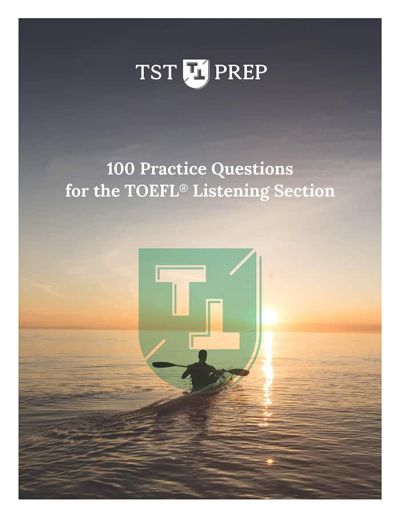The TOEFL Listening section is no walk in the park.
That’s why we’ve created our very own TST Prep TOEFL Listening Practice Questions with Answers that our students can access for free!
The best part?
Each answer also comes with a detailed explanation to help you understand why each response is correct. That’s something you won’t find anywhere else.
So what makes our Listening practice for the TOEFL special?
Here’s an example:
Listen to this TOEFL practice passage transcript below here:
The Sapir-Whorf Hypothesis
The Sapir-Whorf hypothesis is based on the idea that people experience their world through their language, and that they therefore understand their world through the culture embedded in their language. The hypothesis, which has also been called linguistic relativity, states that language shapes thought. Studies have shown, for instance, that unless people have access to the word ‘ambivalent’ they don’t recognize an experience of uncertainty due to conflicting positive and negative feelings about one issue which is the definition of ambivalent. Essentially, the hypothesis argues, if a person can’t describe the experience, the person is not having the experience. Flesch-Kincaid Grade Level: 8.5
1. What is the topic of the lecture?
a. If certain words don’t exist in your language, there’s a reason
b. The idea that language affects our experiences
c. How linguistic relativity shapes the way we think
d. You can predict what someone is thinking based on their language
2. Why does the professor talk about the word ‘ambivalent’?
a. To prove that linguistic relativity is a viable hypothesis
b. To provide an example of linguistic relativity
c. To argue that linguistic relativity is not an accurate hypothesis
d. To further explain the concept of linguistic relativity
1. B
Although C seems correct at first, it is actually not correct because linguistic relativity does not shape the way we think, rather linguistic relativity is the name of the hypothesis that states language shapes the way we think. The main idea is clearly stated in the beginning of the passage and the rest of the passage is an example to build upon the idea.
2. A
The key word here in the answer here is to prove. The lecturer is providing an example of linguistic relativity to an extent, but mainly the lecturer is showing proof that linguistic relativity has evidence for it. The key word to listen for in the lecture is studies show, which generally introduces proof for something. “Studies have shown, for instance, that unless people have access to the word ambivalent, they don’t recognize an experience of uncertainty due to conflicting positive and negative feelings about one issue.”
- Each lecture is short!
- There are only two questions!
You may be wondering: “Shouldn’t we be practicing like the real TOEFL?” Sometimes, but not always. We have designed these TOEFL Listening practice questions to help build your listening skills so you can answer questions quickly and correctly.
With short lecture passages, you won’t feel overwhelmed by so much information. When you focus on a narrow set of content, it’s easier to identify your strengths and weaknesses in listening. If you went to other TOEFL Listening practice sites online, you would make the same mistakes over and over again without understanding why you were wrong.
What you need to know about the TOEFL Listening
The TOEFL Listening section consists of both campus conversations and academic lectures.
But our TOEFL Listening practice only focuses on academic lectures.
Why?
Because academic lectures are more challenging to comprehend than conversations.
If you think about it, a conversation between two people is more interesting than listening to a professor drone on about some academic topic you’re not very interested in.
Also, there are four academic lectures and only two conversations in our TOEFL Listening practice. We believe that if you can master the academic lectures, the conversation passages will be a breeze.
Makes sense, right?
Still, if you want to practice just like the TOEFL test, you can download our free complete TOEFL test.
You’re still here… awesome!
Because we want to share with you some tips on how to get the most out of your TOEFL Listening Practice so you can improve your score.
TOEFL Listening Practice Step 1: Take notes
These passages may be short, but that doesn’t mean you get to skip out on taking notes. Students often decide not to take notes because they prefer to rely on their memory for answers. However, the most common type of question in the TOEFL Listening is a detail question, and these are particularly hard to answer if you rely on your memory alone. To learn more, check out our guide on How to Take Notes Like a Pro.
TOEFL Listening Practice Step 2: Reflect on each passage
These short listening passages were specifically designed to help you improve your TOEFL Listening skills.
First, let’s consider why these short passages are so helpful. For starters, you don’t have to focus on so much material at once. It’s much easier to sort through small bursts of information.
Secondly, these short listening passages allow you to reflect on your answers. If you don’t understand why A, B, C, or D is correct, how will you be able to choose the correct answer in the future?
When you take time to reflect on your answer, you are taking time to make sure you completely understand why you got a question wrong (or right). Just because you got a question correct doesn’t mean you understand it. This is why each question includes a detailed explanation of the correct answer.
TOEFL Listening Practice Step 3: Learn the structure
An important fact about the TOEFL Listening section is that you can’t jump around to answer questions like in the reading. You can’t go back to an answer you skipped. You must choose an answer then move on to the next question no matter what.
If you want to know how many reading passages are on the TOEFL and how many questions there are in total, you need to remember this:
- Conversations are followed by five questions, lectures by six
- Contains two parts, three passages in each part for a total of six passages
- Four academic passages and two conversations
- Conversations are between a student and a campus worker (usually a professor)
- Lectures will last at least four minutes (and it will feel like an eternity)
- Expect 34 questions in total
TOEFL Listening Practice Step 4: Get to know the TOEFL listening question types
How many questions are there in the TOEFL Listening?
The TOEFL Listening consists of two parts, and each part includes one conversation and at least one academic lecture. One part will consist of one campus conversation and one academic lecture, while the other will include three passages, one campus conversation and two academic lectures.
The TOEFL Listening section has eight different question types.
- gist – content (like a main idea question)
- gist – purpose (only in the conversations, not lectures)
- detail (most popular)
- understanding the speaker’s attitude
- understanding the function
- making inferences
- understanding organization
- connecting content
In the chart below, all of the question types have been laid out and separated based on frequency, common lexical structure, and the question point value.
The Listening Section Question Types |
|||
|---|---|---|---|
| Question Type | Question Frequency (per section) |
Question Value | Question Phrasing |
| 1. gist - content | 3-5 | 1 | “What is the topic of the discussion?” “What is the professor mainly discussing?” |
| 2. gist - purpose | 1-2 | 1 | “Why does the student visit the professor?” “Why does the professor mention…?” |
| 3. detail | 6-10 | 1 | “What is stated in the passage about…” "According to the speaker,…” |
| 4. understanding the speaker's attitude |
1-4 | 1 | “What’s the professor’s opinion of…?” “What can be inferred about the student?” |
| 5. understanding the function |
3-6 | 1 | “What does the speaker mean when he says…” “Why does the professor say this…” |
| 6. making inferences | 1-4 | 1 | “What can be inferred about …?” “What does the speaker imply about…?” |
| 7. understanding organization |
2-5 | 1 | “How does the professor organize the information about…” |
| 8. connecting content | 1-4 | 1 | This is a question where you must fill out a table and indicate the correct information. “What does the professor imply about X?” |
Why does this matter?
If you can recognize the type of question you have to answer, you’ve already won part of the battle. Understanding the question type will give you hints and clues as to what to look for and which responses to eliminate.
If you’re still getting questions wrong, you may have…
- Heard some challenging vocabulary words
- Misunderstood the topic of the lecture (or conversation)
- Misinterpreted the tone of the lecturer (or speaker)
It’s not always about strategy when it comes to getting these questions correct. That’s why it’s important to always look up words you don’t know, and practice, practice, practice.
When I talk about TOEFL Listening practice, I don’t mean just taking practice exam after practice exam. Practice your listening skills in every way possible. Watch shows, listen to podcasts and download music in English. Increased exposure is one of the best remedies for a limited vocabulary.
TOEFL Listening Practice Step 5: Set a timer
It’s one thing to sit down and take a few practice exams, it’s another to feel confident under the pressure of the clock.
Here’s the deal.
On the TOEFL exam, you won’t be able to think about a question for 5 minutes. In reality, you have about 30 seconds to answer each question in the allotted amount of time.
How long is the TOEFL Listening? Since December 2023, it has takes 36 minutes and has 28 questions.
Since our TOEFL Listening Practice has short passages and only 2 questions, we suggest trying to answer both in less than a minute.
After you have mastered answering in less than 60 seconds, try to do it in less than 45 seconds. This will help you sharpen your skills and reduce your anxiety about the clock on test day.
To feel confident, rather than time restricted, it’s important to start training yourself to stay calm and answer questions when under pressure. That’s why you should start out giving yourself plenty of time. Focus on improving your listening skills first, then worry about time.
Conclusion
For those of you who are ready to jump in and get started, here are your 100 listening practice questions
TST Prep TOEFL Listening Practice 100 QuestionsDid we miss anything? Any more advice you would like to add about the TOEFL Listening?
Let us know in the space below.
Thanks for reading!









56 Comments
Amira
Thank you for the listening practice but if you can provide speaking practice with answers that will be great.
Josh
Hi Amira and thanks for the comment. I will definitely keep that in mind in the future. These questions do take quite a long time to make though, so it won’t be for a while. However, all of our complete tests include an answer key with sample responses, so you might be interested in taking a look at those in the TOEFL store.
Let me know if you have any other questions or comments 🙂
Linya Zhou
So, I finished the practice so hard, but there was nowhere to find an answer. It’s so sad.
Josh
Thank you for commenting. Here is a link to a document with answers. – https://drive.google.com/file/d/1YPa6udm0AsyKBa-my-AAeF7EMZ8cupqS/view If this is not what you are looking for, please email us at contact@tstprep.com
Yilian
This is amazing! Thank you so much! ???
Do you have something similar for the reading section?
Josh
Sure do Yilian!
Here’s the link to our 100 free reading questions: https://tstprep.com/toefl-reading-practice-100-free-questions/
Hope they help!
Mimi
Hello josh,i really appreciate your efforts for making TOEFL EXAM really easy to comprehend …. can’t wait for your. APP on IOS and ANDRIOD
Josh
Ha! No app in the works right now but thank you for your support. Maybe we can make one in the near future 🙂
Bianca
Josh, just wanna say thank you! Your tips have helped me a lot on the test. Got the score I needed. So thank you very very much!
Josh
That’s great news Bianca! We’re always happy to hear when a student can finally put this test in their past. Good luck and spread the word 🙂
Saeed Mn
Josh, this training is so helpful. Thank you so much.
Josh
Hi Saeed and thank you for letting me know! I’m happy to hear you found it helpful.
Abdul Wasi
Hi Josh, thank you so much for perfect materials for the TOEFL preparation, and it’s highly appreciated,
Josh
Thank you Abdul for commenting. Much appreciated.
Christina
Josh, The way you explain makes it so much easier to learn and understand each task. Thank you so much. Just like it helped me better in my learning journey, I am sure it will help many aspiring students as well. Keep up the amazing work that you do. You’re a gem. God bless you abundantly.
Josh
Wow, this comment made my day 🙂 (and that is quite a compliment). Thank you!
Sreymoch
Thank you so much for this lesson.
Josh
Thank you for sharing. Happy to hear you found some value in the lesson.
Absera
Thank you for the listening practice but if you can provide speaking practice with answers that will be great.
Josh
Hi Absera and thank you for the suggestion, you are the second person to request this in the last week so we will put this on our agenda for tasks to come in the future.
Fatima Jahara
Thank you for the practice questions along with the tips. I would love to have a personal tutor amongst you (best if it’s you Josh) for a month only to prepare for the speaking section. Is there any way to do so? If yes please let me know about the procedure. Thanks in advance!
Josh
Hi Fatima, and thank you for your kind words. Yes, of course, we have TOEFL Speaking tutors who can work around your schedule. I no longer take on private students, and our teachers have more experience working with students than I do at this point. You can find out more here – https://tstprep.com/toefl-store/toefl-private-lessons/
Pascual
Hi, is someone here? I just want to check if this works. Also, I would like to verify my answer about the 5 passages already listened to above. Thanks a lot.
Josh
Hi there Pascual, and yes, I read and respond to pretty much every comment. If you are looking for answers, you can download the accompanying PDF (you will find a link somewhere on this page), and you can check your answers there.
Ve
I think the hardest part for me is remembering. I have the attention span of a mosquito and it’s even worse when the lecture is about something dull like rocks. Any tips on making dull lectures less yawn-worthy?
Josh
Ha, good question. I have some longer lectures about this in the score builder program but the basic gist is to have a goal while you listen. For example, you may want to write down at least 20 words of notes or you want to identify the main idea or you want to write down at least one example the teacher mentions. None of this is very exciting, but when you start listening with a goal in mind rather than just trying to understand everything, you are usually more focused. I hope that helps.
Scarlet
Thank you so much for helping me! I was having trouble studying for my TOEFL test, but the tips that you gave were so helpful that I actually think that I’m gonna do well on it 🙂 You explain things so clearly. I wanna thank you again.
Shaik Fazil
Hello, listening materials are only training me for shorter audios while the actual exam has longer audio tracks, adding that kind of content would be beneficial for us is think.
Josh
Hi there Shaik and thank you for the comment. We provide a free practice test n our site and a few free listening practice tests on our Youtube channel as well so you can practice with longer examples. We also have an additional set of 10 complete practice tests for purchase on our store page if you need more. https://tstprep.com/store/complete-toefl-test-pack/
Tanpreet Singh
Hi Josh, I need help regarding two sections of TOEFL iBT. How can I improve my listening and reading scores?
Josh
Hi there Tanpreet and thank you for your question. This is hard to answer of course because it depends on the student, your history, and your goals. However, I think a good place to start is this video about practicing at home for the TOEFL Reading (https://www.youtube.com/watch?v=osGQ6axyI7I&ab_channel=TSTPrepTOEFL), and this one about the TOEFL Listening (https://www.youtube.com/watch?v=IPZaRDfATv4&ab_channel=TSTPrepTOEFL). If you still need help, you might want to consider a trial lesson with a TOEFL teacher so he can give you more personalized advice. Here is the link to the trial lesson (https://tstprep.com/store/toefl-trial-lesson/).
Mike
Hello Josh!
May I ask you to give me some advice about how to improve my listening section? I am able to understand about 80 percent of the listening but when I face questions, I realize that I don’t understand anything and it seems to me that I can’t remember what I’ve just heard.
Josh
Hi Mike and good question. It is hard for me to say since much of my advice depends on each individual student. However, if you are having trouble with answering most of the questions, then I believe the test is too difficult at your current level. As a kind of self-test, I would listen to one of the TOEFL listening passages, pause it every ten seconds or so and try to write down everything you hear. If you are missing a lot of the vocabulary then you should work on more general listening and vocabulary acquisition before trying to take the TOEFL.
If you do understand most of the passage, then I would practice the TOEFL in reverse. try to answer the questions first and then listen to the passage. Over time, that might help you see patterns in the listening passages and also provide you with some listening strategies to help you on test day.
Sherin
How to try to answer the questions first and then listen to the passage without listening first?
Josh
Great question. The goal of this activity is NOT to get the questions correct, instead, the goal is to anticipate the passage. Most of the time, when you listen to a lecture, you just sit back and wait for information. I want you to take a more active approach, to listen with goals in mind. By answering the questions first, you are listening to check your answers, which helps you become more active. It also provides the added bonus of becoming familiar with the question types and typical trap answers in the listening.
Harsimrat
Hi, I’m Harsimrat. Firstly, I just want to thank you for providing us with this beautiful concept that I want. I tried everywhere to find this concept, but this website makes it easy. I need help understanding all the single words of the listening section, but when I used to do the questions, I used to forget the concept of what I actually heard. Also, I have less to cover it. It may be just 20 days. I hope you will help me!
Herund
Hello Josh,
This was really helpful, thanks.
But… I still have some problems with the fact of taking notes. Almost all the time when I am answering the question, I don’t use my notes cause they don’t contain most of the points being asked, and I don’t know how to get off this. I mean on the full listening practice questions.
Josh
Thank you for the question. Some people may do better without notes. If you find that note-taking hurts your listening ability and the notes are not generally not helpful, then try only listening. You may get a few more of the detail questions wrong, but you may find you get more of the general questions right, as you won’t miss huge chunks of information while you write.
Zeyiad
Hi Josh
I want to ask you if I can score above 90 on the TOEFL test I am not good enough in English I just studied from grade 2 to 4 in an international school I have six months to take the tests is that impossible?
I have written this message using Grammarly lol 😄
My native language is Arabic.
Take care
Zeyiad
Josh
HI Zeyiad, Thank you very much for your message. A score of 90 means you have a fluent or near fluent level of English. If you do not believe this is the case, then you are unlikely to reach your score right now. Can you do it in six months? It is possible but it would depend on many factors such as your current level of English, how much you study every day, how you practice, and if you are speaking English in your daily routine. If you live in a country where few people speak English, it is likely to take you longer. Perhaps consider doing a 30-minute trial with TST so we can asses you a little more accurately. All the best.
Mai
Hi Josh! My current level is A2+, and I am studying English at Boston University in Boston. I would like to know if I can achieve an 80/120 score on the TOEFL after the next seven months. Please give me a helpful schedule and some advice. Thank you!
Josh
Hi Mai, to achieve a score of 80/120, it would be best if your English level was at least a solid B2, This could be possible in seven months but it would require serious preparation. The more you practice your English, the better your chances will be. I can’t really provide you with a schedule without knowing more about you, your level in each subject, and the amount of study time you plan to devote each day. I would suggest you book a TOEFL Trial lesson so you can talk with a teacher and receive at least a partial evaluation.
Hm
Hi Josh, My test is in the upcoming week and I am having difficulty in the listening section, especially the lectures. I get stuck answering questions related to detail and understanding organization and I think the reason is when I note down something while listening Although I don’t take notes too much but, I miss some words. Is there any advice for this?
Josh
Hi, This is a very common question. Many people do well-taking notes, but some do better at taking no notes at all. This means you are using 100% of your energy to listen and will have a better understanding of the overall passage. It’s not a perfect solution as you may miss some detail questions, but it might be worth a try. I would suggest doing a few passages with no notes and see if you notice a difference in your scores.
Angela
Hi, I try to jot down the notes, but I don’t know the vocabulary or am too slow to follow the conversation. Personally, I have no idea how to take notes while listening.
Josh
Hi, I understand the problem. We have some great articles about note-taking. https://tstprep.com/articles/toefl/taking-notes-for-the-listening-section-of-the-toefl-test/
Another strategy is to not take any notes. Instead, use all your energy to listen and see if you can remember more than with notes. Hope this helps.
Khalil Ahmad
The strategies are not same for everyone. personally, I have never used notes, but still got 28 in my previous exam. I am sure that if I was to adopt note taking strategy, I would not get more than 15, as I tried it multiple times in practice tests.
Josh
Very true! Of course, no two people are the same. Some people do better with no notes. However, many feel better if they write things down. To that end, we try and do our best to show them so strategies as to how to do this. Congrats on your great score! 🙂
Reeba
I am not completely sure how can one not take notes for the lecture portion of the test? they are mainly about history geography or new invetions , how can we remember details about industrial revolution in 5 mins without notes? any tricks?
Josh
Hi there and thank you for commenting. Here is the link to an article on note-taking that you might find useful: https://tstprep.com/articles/toefl/taking-notes-for-the-listening-section-of-the-toefl-test/
Syeda
Hi Josh! I am taking the TOEFL Home Edition, and note-taking is not allowed. I vary the proctors, allowing a desktop whiteboard for notes. Do you think one can score high without taking notes and solely relying on their memory?
Josh
Hi, and thanks for your question. Whiteboards should always be allowed on the home edition. The rule should not change from proctor to proctor. I strongly suggest you contact ETS with your concerns. You will do your best if you can take at least some notes.
Sara
Hi! I took the test listening practice that you have provided in the video. Where can I find the correct answers to check my grade? Thank you!
Josh
Hi Sara, When you click on the link provided and register with TST Prep (for free), you will be able to see the answers. Please don’t hesitate to let us know if you have any trouble finding it.
Hanaa
Hi Josh, i wonder if you have one to one online classes
Thank you
Josh
Hi Hanaa and thank you for commenting. You can find information about private classes with our professional TOEFL tutors here – https://tstprep.com/store/toefl/private-lessons-for-the-toefl-ibt/.